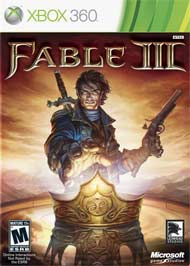Fighting for Albion
Fable III does a lot right. Its storytelling is superb, and it introduces a number of worthwhile new features. Unfortunately, though, its unsatisfying combat and lackluster second half make it at least as much of a disappointment as it is a success.
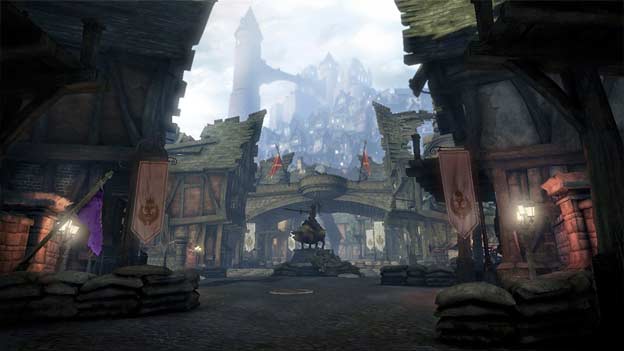
The game opens with a moment of sheer genius. It’s a cutscene about a chicken who escapes the man planning to slaughter him. As the chicken runs through town trying to avoid death, injury, and captivity, the narrator explains what’s going on in Albion today, fifty years after the events of Fable II. It’s an artistic and poignant way to introduce the theme of freedom that runs through the title.
Then you step into the shoes of your hero, a son of Fable II’s protagonist. (If you have a Fable II save on your hard drive, you can import your old hero’s attributes.) Unfortunately, you’re the younger son, and your older brother is ruling the land as a tyrant. It’s a scene straight out of Charles Dickens, with massive poverty, child labor, and a ruling class that can turn from exploitative to hostile at the drop of a hat. When you and a friend try to stop your brother from executing some innocent citizens, he offers to execute your friend instead. After making this choice, you flee the castle and plot to overthrow the king. This entails approaching Albion’s various unsatisfied factions and winning their support. You do them a lot of favors and make them a lot of promises.
Your struggle to become king—the first half of the game—showcases the series’ amazing storytelling. There’s a lot of gross-out, slapstick, and one-liner humor, but there’s also a tale about the fight against oppressive government. Your missions involve everything from putting on ridiculous costumes and performing in plays, to digging up a grave, to seducing a woman at the behest of her fed-up husband, to taking down a captain of industry who shoots his employees for not working hard enough. Anyone who doubts that video games can tell real stories should experience this.
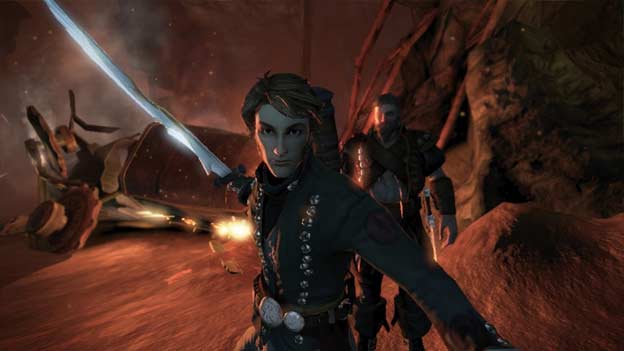
The gameplay, unfortunately, is a mixed bag. The developers succeeded in their goal of making Fable III not feel like an RPG; there are virtually no menus here. Even the pause menu isn’t a menu, but rather a “sanctuary” room in which you can change clothes and weapons, adjust the game settings, view your statistics, and save. You don’t level up in the traditional manner, but rather by opening treasure chests on the “Road to Rule” that improve your skills. Opening chests requires “guild seals,” which you earn by killing enemies and completing quests. While you’re on a quest, a sparkling line directs you to your next goal. This system works for the most part, though it got confused a few times during our time with the game.
The developers also succeeded in expanding upon the series’ trademark character dynamics. Performing good deeds makes your character traditionally handsome or beautiful, while performing evil deeds makes your character ugly. Your body also adjusts to your play style; shooting makes you tall, and melee combat makes you strong. Your weapons improve, becoming better at blocking and attacking as you use those skills. What’s amazing is that these processes don’t interrupt the game—they make you “level up” in a way, but you don’t have to distribute points or deal with long lists of attributes. Even the world around you transforms to reflect your decisions.
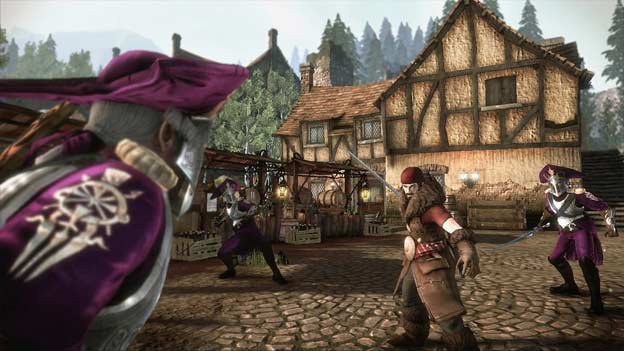
The problem is that the combat isn’t even a little bit satisfying. For starters, it’s way too easy. You can’t die. You can only be “knocked out,” the penalty for which is that you lose whatever progress you’ve made toward your next guild seal. And even that doesn’t happen very often; we were knocked out only three times in our entire first playthrough. Fable III is an M-rated RPG with blood, profanity, and sex, but when it comes to difficulty, it takes its cues from the Lego franchise.
Perhaps the developers made the combat so easy because the controls are clunky, and anything more difficult would just be frustrating. Melee fighting in particular is a pain; your character takes too long to execute moves, including dodging, which leaves him open to attack for too long. Attacking with guns and magic is much more effective, but ranged attacks can be difficult to aim, thanks to the fact that there are always tons of enemies on the screen at once. In a nod to third-person shooters, the game allows you to aim guns manually, but it’s not practical to do so in the heat of combat. Overall, the developers could have learned a lot from Bayonetta, a game that combined melee and ranged combat, felt easy to control, and challenged the player.
Despite the iffy combat, though, the first half of the game is a joy to play. The same can’t be said for the second half, which quite frankly feels thrown together. Now that you’re the boss, you have to decide whether to keep the promises you made. The problem is that you have exactly one year to prepare for an attack by an evil force that has been plaguing the nearby land of Aurora, and the only way to raise money to fight the attack is by ignoring the promises.
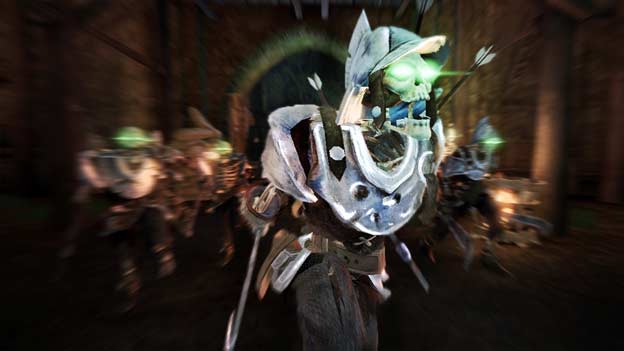
This could make for a great plot, requiring you to be diplomatic with the factions to which you made promises. But it doesn’t really fit the whole Fable idea of good vs. evil; you’re not deciding whether to be good or bad, but rather how to weigh the promises you made against the threat of impending mass death. And more important, there is no diplomacy here. You can’t reason with the people who come to collect on their promises. You can only accept or reject their proposals.
Also, it’s almost impossible to make sense of the second half on your first playthrough. Protecting Albion without incurring casualties requires a specific amount of gold, which (unless we missed some serious money-making opportunities) means you have to break a certain proportion of your promises. However, the timeline jerks forward many days at a time, and you can never be sure how much money you’ll be able to make or lose with your next decision, so it’s nearly impossible to develop a plan for how to accept and reject proposals. We kept on track for a while (at a third of the way through the year, we had about a third of the money we needed), but soon fell behind, and in the end we were able to save just over half the population.
The game breaks up the monotony of being king by sending you on a few random quests. Unfortunately, it makes absolutely no sense for a king to be confronting robbers or hunting for treasure in faraway caves. The game’s writers could have capitalized on this absurdity with the humor we saw in the first half, but they didn’t, so it just seems weird.
Once you’ve beaten the game (which took us a respectable but decidedly not-epic ten hours), the game world remains open. You’re free to complete the many side quests you probably missed (we had more than twenty available), pick up collectibles, buy land, raise a family, and accumulate sex partners. For many, this will no doubt be the bread and butter of the Fable III experience, as it offers a whole world in which to make your mark without worrying about overthrowing a king or preparing for war. Then again, it’s awfully tempting to start over and play the game a different way to see how everything changes.
Fable III also offers a co-op system that’s much improved over that of its predecessor. You can invite other players into your world, and the two of you split any rewards you earn (except advancing the storyline, which occurs only in the host’s world). You can even marry other players, presuming you’re willing to share your resources and split everything down the middle in the event of a divorce. This allows you to see the worlds that other players created, and to develop your character in co-op instead of playing as someone else, as Fable II required you to do. This feature’s quality will become clearer once massive numbers of people log in, but it worked well in our pre-release experience with it.
When it comes to presentation, Fable III is decent but far from mind-blowing. The graphics can impress, but they often suffer from a lack of detail and various technical problems, most noticeably pop-in. The voiceover work is outstanding, and the music and sound effects befit the game’s eighteenth-century vibe.
Fable III is a good game, and in some ways it’s a great one. But playing it, one can’t help but wonder what it would be with better combat and a more thoughtful second half.
RATING OUT OF 5 RATING DESCRIPTION 3.5 Graphics
Fable III presents a big world, and the visuals are sometimes impressive, but there’s too much pop-in and not enough detail. 2.8 Control
The melee combat feels clunky, and it’s difficult to aim ranged weapons. 4.5 Music / Sound FX / Voice Acting
The music, sound effects, and excellent voiceover all fit the atmosphere. 3.8 Play Value
Each playthrough takes about ten hours, and there’s plenty of replay value, but the combat is uninspiring, and the second half isn’t very good. 3.7 Overall Rating – Good
Not an average. See Rating legend above for a final score breakdown.
Game Features:
